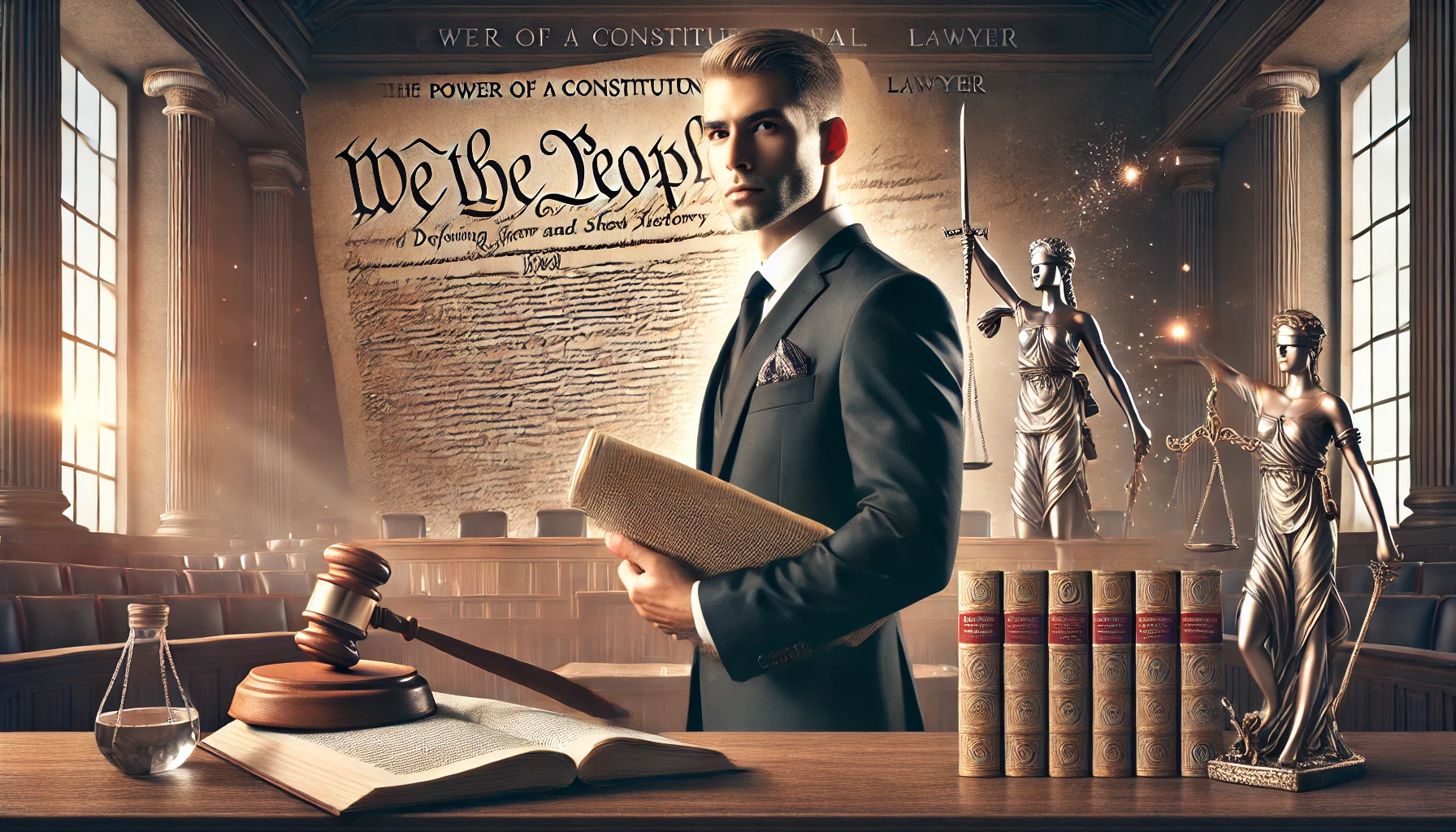Introduction: What is a Constitutional Lawyer?
A constitutional lawyer is someone who protects and defends the laws written in the Constitution. Their job is to interpret these laws and fight for people’s rights, ensuring that justice and fairness are upheld in society. Whether it’s defending someone’s freedom of speech, fighting unlawful government actions, or making sure equal rights are protected, constitutional lawyers work to ensure that everyone is treated fairly.
This profession goes beyond just arguing in court—it’s about standing up for what is right and fair. Imagine having someone by your side who is deeply committed to protecting your most basic rights, like freedom, privacy, and equality. That’s what a constitutional lawyer does.
For anyone who feels like their rights have been violated, finding a constitutional lawyer near me could be the first step toward justice. These lawyers have the power to make sure the laws that protect you are enforced, providing a sense of security and hope to those who need it most.
Why You Might Need a Constitutional Lawyer
You might need a constitutional lawyer when your basic rights are at risk. Think about situations like when someone’s freedom of speech is being silenced. Maybe you spoke up about something important, and now you’re being punished for it—that’s where a constitutional lawyer steps in, ensuring your voice is protected.
Or imagine facing an unlawful search or seizure. If someone in power invades your privacy without the right reasons, a constitutional lawyer can fight to defend your right to privacy. These moments can feel overwhelming, but knowing there’s someone who understands the Constitution and will stand up for you can be a huge relief.
Discrimination is another situation where you might need help. Whether it’s based on race, gender, or religion, being treated unfairly is deeply hurtful. A constitutional rights lawyer can make sure the laws meant to protect against discrimination are enforced, giving you a real chance to fight back.
When you feel like you’re up against forces bigger than yourself, a constitutional lawyer brings hope, fairness, and the expertise needed to defend what’s right. These situations remind us how valuable it is to have someone who understands the law standing by our side, ready to protect the freedoms we hold dear.
How a Constitutional Lawyer Protects Your Rights
A constitutional lawyer serves as the shield that guards your most important rights. Whether inside the courtroom or through legal actions outside, these lawyers take on the role of defenders of civil liberties. Imagine someone standing firmly by your side, ensuring that no one can take away your freedoms, not even the most powerful institutions.
In the courtroom, a constitutional lawyer fights for your justice. Whether you’ve been wrongfully accused, had your freedom of speech threatened, or faced discrimination, they step in to make sure your voice is heard and your rights are protected. They know the Constitution inside out and use that knowledge to argue your case, making sure no injustice goes unchallenged.
But their work doesn’t stop in the courtroom. Constitutional lawyers also challenge unfair laws, push for legal reforms, and defend people against government overreach. Their role as protectors goes beyond individual cases—they stand up for the rights of communities, ensuring that the laws governing us remain fair and just.
Having a constitutional lawyer is more than just legal help—it’s about having someone who believes in your right to be free from oppression and injustice. They fight so you can live without fear that your rights will be stripped away. When everything seems uncertain, knowing you have a guardian of your freedoms gives you the strength to stand tall.
Constitutional Lawyer vs. Civil Rights Lawyer: What’s the Difference?
At first glance, constitutional lawyers and civil rights lawyers might seem like they do the same work, but they protect freedoms in different ways. Understanding the difference can help you choose the right advocate when your rights are at stake.
A constitutional lawyer focuses on the broad interpretation and defense of the Constitution itself. They handle cases where the laws or actions of the government clash with the rights and freedoms outlined in the Constitution. For example, if your freedom of speech is being violated or your right to privacy is at risk, a constitutional lawyer will step in to argue that these core rights are being undermined. Their work often challenges laws that affect society as a whole, aiming to protect the legal framework that keeps the country just and fair.
On the other hand, a civil rights lawyer focuses on protecting individuals from discrimination or unfair treatment based on race, gender, religion, or other personal characteristics. Civil rights lawyers fight to make sure equal protection under the law is enforced. Whether it’s a case of employment discrimination or racial profiling, these lawyers work on behalf of those whose rights have been violated due to personal traits. Their work is often centered on ensuring equal treatment for everyone, regardless of background.
Choosing between a constitutional lawyer and a civil rights lawyer depends on your specific situation. If you’re facing a broad constitutional issue, like a law that limits freedom of religion or speech, a constitutional lawyer is the right choice. But if you’re dealing with personal discrimination or inequality, a civil rights lawyer will focus on ensuring you are treated fairly.
Each type of lawyer serves as a protector of justice—but understanding the nuances between them can help you get the right help in the fight for your rights.
The Path to Becoming a Constitutional Lawyer
Becoming a constitutional lawyer isn’t just a career choice; it’s a calling for those deeply committed to justice, democracy, and equality. It’s a journey that requires not only education but a passion for protecting the very foundations of society.
The path begins with earning a bachelor’s degree. Most future lawyers study fields like political science, history, or law-related disciplines to build a strong understanding of how the legal system works. But more than just academics, this stage is about developing a curiosity for the rights and freedoms that shape our lives.
Next comes law school, where aspiring constitutional lawyers dive deep into subjects like constitutional law, civil rights, and federal courts. Law school is not just about learning the legal jargon—it’s about learning how to defend the Constitution. Students learn how to argue cases that protect the rights of individuals and challenge unfair laws. During this time, many future constitutional lawyers take part in internships or clerkships with judges or law firms, giving them real-world experience in fighting for justice.
After law school, passing the bar exam is the next step. This exam is challenging, but it’s a gateway to practicing law and advocating for others. Once licensed, many constitutional lawyers work in law firms, nonprofits, or government agencies that focus on defending constitutional rights. Some even work in academia, helping to shape the next generation of lawyers.
But the most important element of this journey isn’t just about tests and degrees—it’s about the dedication to protecting what matters most. Constitutional lawyers are driven by a desire to defend freedom, equality, and justice for all. They stand up for what’s right, often facing tough battles, but knowing that their work shapes the future of the nation.
This career attracts those who believe in the power of the Constitution to safeguard democracy. It’s for individuals who aren’t just looking for a job, but for a purpose—a chance to fight for what’s fair and just in the world.
Constitutional Lawyer Salary: What Can You Expect?
The salary of a constitutional lawyer can be quite rewarding, but it’s important to remember that the real compensation goes beyond the numbers. These lawyers take on some of the most significant legal challenges—defending freedoms, upholding justice, and shaping society in meaningful ways.
On average, a constitutional lawyer’s salary can range from $60,000 to $150,000 per year, depending on experience, location, and the types of cases they handle. Those working in private firms or representing high-profile cases might earn more, while those in nonprofits or government positions might earn less. However, many in the field believe that the financial reward is just part of the equation.
What makes this career unique is the emotional toll and the reward of defending the Constitution. Every case can impact freedoms and rights that affect not just individuals, but entire communities. The work of a constitutional lawyer is often challenging, involving long hours and complex legal battles, but the sense of fulfillment that comes from making a difference in the world is priceless.
When you choose to become a constitutional lawyer, you’re not just earning a paycheck—you’re fighting for a fairer, more just society. The true reward lies in knowing that your efforts contribute to protecting democracy, ensuring equality, and defending the rights of people who might otherwise be powerless. The salary may be important, but the impact on society is what makes this profession truly valuable.
Where to Find a Constitutional Lawyer Near Me
When you need a constitutional lawyer, finding the right advocate is critical for protecting your rights and securing justice. The process can feel overwhelming, but with the right approach, you’ll find a lawyer who has the experience and dedication to stand up for your constitutional freedoms.
Here are a few tips for finding a constitutional lawyer near me:
- Online Search and Legal Directories: Start by searching online for constitutional lawyers in your area. Websites like Avvo, Justia, or FindLaw provide listings of lawyers, complete with reviews, specialties, and ratings. Make sure to read client feedback, as it gives insight into how the lawyer handles constitutional cases.
- Local Bar Association: Contact your local or state bar association, which can provide a list of constitutional lawyers near you. These organizations often have referral services to connect you with lawyers who specialize in constitutional law.
- Recommendations: Ask for recommendations from friends, family, or colleagues who have experience with constitutional lawyers. Personal referrals can often lead you to trustworthy and capable lawyers who are passionate about defending rights.
- Legal Aid Organizations: If you’re unable to afford a lawyer, consider reaching out to legal aid organizations that offer free or low-cost legal services. Many nonprofits are dedicated to civil rights and constitutional law, providing skilled attorneys to represent people who need help the most.
Finding an experienced constitutional rights lawyer is key to building a strong case. It’s important to choose someone who not only understands the law but has a proven track record of fighting for constitutional freedoms. A good lawyer will guide you through complex legal procedures and ensure that your case is heard and fought with the dedication it deserves.
9 Essential Steps to Hiring the Best Car Accident Lawyer in Charlotte, NC for Maximum Compensation
Constitutional Lawyer and Landmark Cases: Shaping History
Constitutional lawyers have played an essential role in shaping history through landmark cases that have forever changed the fabric of society. These lawyers fight on the front lines, challenging unjust laws and defending the freedoms that define our nation. Some of the most significant moments in history came about because constitutional lawyers stood up for what was right, even when it wasn’t easy.
One powerful example is the case of Brown v. Board of Education (1954), where constitutional lawyers helped end racial segregation in public schools. This case wasn’t just about school policies—it was about the fight for equality and justice. The lawyers who argued this case didn’t just win a legal battle; they ignited a movement that changed America’s course, allowing future generations to grow up in a world where civil rights are taken more seriously.
Another landmark case is Roe v. Wade (1973), which involved a constitutional lawyer fighting for a woman’s right to choose. The decision in this case not only changed the lives of women across the country but also sparked debates that still impact society today. The constitutional lawyer behind this case wasn’t just working for one individual—they were defending the right to privacy for all.
Cases like these show how constitutional lawyers are more than just legal professionals—they are history makers, responsible for bringing about the changes that transform society. They challenge unfair laws, confront injustice, and ensure that our rights, enshrined in the Constitution, are protected for everyone. Without their efforts, the world we live in today might look very different.
When a constitutional lawyer takes on a case, they are standing up for the principles that define who we are as a society—freedom, equality, and justice. They aren’t just winning cases; they’re shaping the world and fighting for a future where everyone’s rights are respected.
Why You Need a Constitutional Rights Lawyer to Defend Your Freedoms
When your freedoms are at risk, having a constitutional rights lawyer by your side can make all the difference. These lawyers stand as defenders against the creeping threat of government overreach, ensuring that your most fundamental rights are protected. Without them, the freedoms we often take for granted—like freedom of speech, privacy, and equal treatment under the law—could slowly erode.
Imagine a world where your voice is silenced, where your right to privacy is invaded, or where laws are passed that treat some people unfairly. In moments like these, it’s easy to feel powerless. But a constitutional lawyer is there to stand up for you, fighting to ensure that no one, not even the government, can take away your liberties.
These lawyers are more than just legal experts—they are the guardians of justice. They push back when the powerful try to limit your rights, whether it’s in the courtroom, the halls of government, or through new laws. Their work isn’t just about one case or one person—it’s about protecting the freedoms of everyone, making sure that justice is available to all, not just a privileged few.
When the stakes are high, and your rights are on the line, a constitutional rights lawyer can be your greatest ally. They understand the law, but more importantly, they understand the deep importance of ensuring freedom for all. Without these lawyers, the risk of losing our most cherished rights becomes all too real. It’s not just about winning a case—it’s about defending democracy and the values that make our society just and free.
Common Constitutional Issues: Why a Lawyer is Essential
Many people face constitutional issues in their everyday lives, often without realizing how critical these rights are until they’re threatened. Here are some of the most common issues, and why having a constitutional lawyer is essential to defending these core values:
- Free Speech: Whether you’re protesting, writing online, or simply expressing an opinion, your right to freedom of speech can be challenged. A constitutional lawyer ensures that your voice is protected when the government or other powerful entities try to silence you.
- Freedom of Religion: From practicing your faith openly to being free from religious discrimination, the right to religious freedom is fundamental. Constitutional lawyers defend these rights when they’re threatened, ensuring that everyone can worship (or not worship) as they choose.
- Right to Privacy: Whether it’s an unlawful search of your home, or your personal information being used without your consent, privacy issues affect us all. A constitutional lawyer fights against unlawful surveillance or searches, making sure your personal space and information are respected.
- Due Process: The government must follow fair procedures if they take away your life, liberty, or property. If you’re arrested, detained, or facing legal action, due process ensures you get a fair hearing. A constitutional lawyer ensures that the rules of justice are followed, protecting you from being wrongfully punished.
- Equal Protection Under the Law: Everyone, regardless of race, gender, or background, is entitled to the same treatment under the law. When discrimination occurs, a constitutional lawyer steps in to make sure your rights to equality are upheld.
Facing these issues can be overwhelming, but with a constitutional lawyer, you’re not fighting alone. They stand up for the rights that shape our country and ensure that no matter the challenge, your freedoms remain intact. Whether in the courtroom or through negotiations, having an experienced lawyer means you have someone on your side defending the values of justice and fairness that the Constitution guarantees.
How to Choose the Right Constitutional Lawyer
Choosing the right constitutional lawyer is one of the most important decisions you can make when your rights are at stake. This isn’t just about finding someone with legal expertise—it’s about finding a lawyer who has the experience, passion for justice, and a proven track record of standing up for what’s right. Here are some key tips to help you make the best choice:
- Experience in Constitutional Law: Look for a lawyer who specializes in constitutional law. These cases can be complex, involving deep knowledge of the Constitution and how it applies to various legal issues. A lawyer with years of experience handling constitutional rights cases will have a better understanding of how to navigate the legal system and protect your freedoms.
- Proven Track Record: When considering a lawyer, ask about their success in previous constitutional cases. A strong track record of winning cases or making significant legal impacts is a sign that they know how to handle complex legal battles. It also gives you confidence that they can secure a favorable outcome for you.
- Passion for Justice: Constitutional law is often about more than just winning a case—it’s about fighting for justice, fairness, and the rights of individuals. A great constitutional lawyer will be driven by a passion for these values, showing that they truly care about your case and are ready to go the extra mile to defend your rights.
- Communication and Transparency: The right lawyer will be open and honest with you about your case. They should explain the legal process in simple terms, ensuring you understand every step along the way. A lawyer who communicates clearly will give you peace of mind and make you feel secure that your rights are in good hands.
- Client Testimonials: Look at reviews and testimonials from previous clients. How did the lawyer handle their cases? Were they responsive, knowledgeable, and dedicated? Hearing from others who have worked with the lawyer can provide insight into what you can expect.
When you choose the right constitutional lawyer, you’re not just hiring a legal professional—you’re finding a guardian of your fundamental rights. This decision should provide you with emotional comfort and a sense of security, knowing that someone is fighting for your freedoms. A good constitutional lawyer will not only represent you in court but will be a true advocate for the justice you deserve.
Conclusion: The Essential Role of Constitutional Lawyers in Society
Constitutional lawyers are the defenders of the most crucial laws in our country, ensuring that our freedoms, justice, and equality are preserved. Without their dedication, the rights that form the foundation of our democracy could be at risk. These lawyers are more than just legal experts—they are champions of liberty, fighting against injustice and government overreach. Their work touches the lives of everyday citizens, offering protection when our most basic rights are threatened.
The emotional weight of their roles is immense. They don’t just handle cases; they defend the very essence of what makes society fair and just. Without constitutional lawyers, our rights could slowly fade, leaving us vulnerable to oppression and inequality. By standing up for the Constitution, they protect us all, ensuring that justice and freedom remain at the heart of society.
FAQs
Do constitutional lawyers make a lot of money?
Yes, constitutional lawyers can earn a competitive salary, typically ranging from $60,000 to $150,000 per year, depending on experience and location. While some may earn more in private practice, many choose this career for the fulfillment of defending fundamental rights rather than for the financial rewards.
Who is the well-known constitutional lawyer?
One of the most famous constitutional lawyers is Ruth Bader Ginsburg, who, before becoming a Supreme Court Justice, was known for her work on gender equality and constitutional rights.
How does constitutional law work?
Constitutional law involves interpreting and defending the Constitution. Lawyers in this field challenge laws, policies, or actions that violate constitutional principles, such as freedom of speech, religion, or equal protection under the law.
What’s the highest-paid type of lawyer?
The highest-paid lawyers often work in fields like corporate law, intellectual property law, or medical malpractice, where salaries can exceed $200,000 annually.
How hard is constitutional law?
Constitutional law can be challenging due to its complexity and the high stakes involved in defending or interpreting fundamental rights. Lawyers must have a deep understanding of legal history, government structures, and the evolving nature of constitutional interpretation.
Discover the Attorney realm with The Expert Law. Visit our website for endless inspiration!





